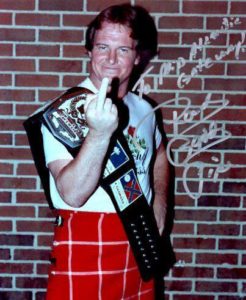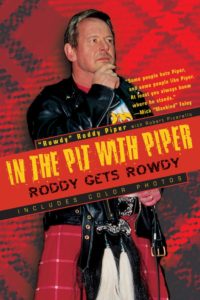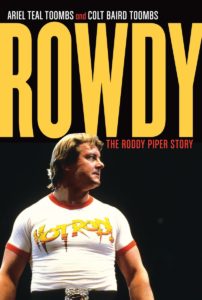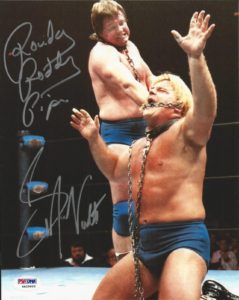 Rowdy Roddy Piper is my all-time favorite wrestling personality and one of the reasons this column exists. I was one of many little kids who were initially hooked on the True Sport of Kings via his feud with Hulk Hogan and the Rock ‘n’ Wrestling Connection. Piper’s attack on Cyndi Lauper and Captain Lou Albano during a WWF event had incurred not only Hogan’s wrath, but also that of many pop culture figures. Numerous celebrities from Dee Snider to Gloria Steinem (and even Democratic vice presidential candidate Geraldine Ferraro!) voiced their public support for the Hulkster to get his hands on the Hot Rod. Hogan and Piper would finally clash at Madison Square Garden in the War to Settle the Score as seen on MTV. Roddy did not win the battle and Hogan’s world championship, but he didn’t exactly lose either. This war did not settle the score after all, which led to the Hulkster tag teaming with Mr. T against Piper and “Mr. Wonderful” Paul Orndorff a month later at the inaugural WrestleMania. Much has happened in the years since.
Rowdy Roddy Piper is my all-time favorite wrestling personality and one of the reasons this column exists. I was one of many little kids who were initially hooked on the True Sport of Kings via his feud with Hulk Hogan and the Rock ‘n’ Wrestling Connection. Piper’s attack on Cyndi Lauper and Captain Lou Albano during a WWF event had incurred not only Hogan’s wrath, but also that of many pop culture figures. Numerous celebrities from Dee Snider to Gloria Steinem (and even Democratic vice presidential candidate Geraldine Ferraro!) voiced their public support for the Hulkster to get his hands on the Hot Rod. Hogan and Piper would finally clash at Madison Square Garden in the War to Settle the Score as seen on MTV. Roddy did not win the battle and Hogan’s world championship, but he didn’t exactly lose either. This war did not settle the score after all, which led to the Hulkster tag teaming with Mr. T against Piper and “Mr. Wonderful” Paul Orndorff a month later at the inaugural WrestleMania. Much has happened in the years since.

Although I was a proud-to-be-brainwashed Hulkamaniac in my childhood, Roddy Piper turned out to be the wrestler I identified with the most. He was the skinny kid wearing a “dress” and managing to survive in a world of macho giants. He said whatever he wanted, not caring if it offended anyone. Of course, he managed to offend just about EVERYONE in his heyday! No one was safe from Piper’s verbal assault and virtually nothing was off limits—he was politically incorrect well before it was a ‘thing.’ People hated him enough to want to kill him, but he’d simply laugh in their faces and dare them to try. What can I say? I loved the guy. My dad made me a sweet HOT ROD t-shirt with a near-perfect hand drawn logo and I wore it with pride. I even have a giant Rowdy Roddy Piper beach towel in a box somewhere!

Roddy’s autobiography In the Pit with Piper was one of the first pro wrestling memoirs I acquired. Unfortunately, it is also one of the more disappointing books on the subject. Aside from exaggerations that one can expect from an old school wrestling BS session, In the Pit with Piper is rife with factual and historical errors. Dave Meltzer’s review in his Wrestling Observer newsletter pointed out many of the mistakes, which certainly ticked off the Hot Rod. His reaction to Meltzer’s criticisms indicated that Piper either did not understand or care that we were interested in an accurate, in-depth account of his life and career. I would acquire higher-quality works from many of his peers—particularly those of Bret Hart, Mick Foley, and Chris Jericho—in subsequent years. Roddy must have eventually realized that he deserved a better story, because he began extensive research on a new book about his life titled Rowdy: The Roddy Piper Story. I looked forward to his new autobiography with great anticipation, but he unfortunately passed away shortly into the project. Piper once said in an HBO interview that he didn’t expect to make it to 65 years old; he was 61 when he passed. Just when he thought he had the answers, life’s inevitabilities changed the questions.

Ariel and Colt Toombs—Piper’s middle daughter and only son—knew that their father’s story was too important to leave untold, so they took on the responsibility of finishing the book themselves. I can imagine this being far from an easy task. Roddy intended to set the record straight for himself as much as he wanted to for his fans. That said, he maintained a particular narrative regarding his life and journey for decades. He was vague about his upbringing prior to the True Sport of Kings. He embellished some aspects of his story. Others were outright false. He wasn’t necessarily lying per se; he was selling his onscreen character to the public more than anything. Most of the great wrestlers simply dial themselves up for fan reaction and Piper was no exception. Rowdy Roddy Piper: Professional Wrestler was Roderick Toombs with a few tweaks and turned up full blast! However, he would come to forget the line between reality and pro wrestling ‘kayfabe,’ sticking to his narrative because it was easier to tell. Ariel and Colt acknowledge all of this, then get to digging past all of that.
Quite a few of Roddy’s colleagues help put the pieces together, such as former NHLer (and childhood friend) Cam Connor, Chavo Guerrero, Stan Hansen, Bret Hart, famed martial arts trainer Gene LeBell, Rick Martel, and Bruce & Tom Prichard. We learn of his childhood and his parents, where it should come as no surprise that Piper came from humble beginnings. Many of his early family stories are funny, but there is certainly a side that is quite the opposite. He became accustomed to a nomadic lifestyle, developing a healthy resentment of authority and leaving home at an early age. Young Roddy hit the streets, often resorting to desperate measures to survive. His acceptance into pro wrestling’s secretive brotherhood came after enduring a litany of petty crimes, practical jokes, in-ring beatings, and pseudo-sexual harassment—all par for the course for a young rookie wrestler. Okay, so he wasn’t actually fifteen years old when he had his first match as he has claimed all of these years. No big deal; the man was simply trying to put his homeless past behind him.
They cover Piper’s rise to the top, recalling classic rivalries and incidents in each of the territories. Some of these stories have been untold outside of wrestling folklore, such as when a burned-out Piper steals a cab on a Japanese tour and proceeds to drive it right through a restaurant’s front door! He stumbles a couple times while climbing the ladder of success. Piper’s Madison Square Garden debut is a bust when a locker room “prank” ruins his pre-match bagpipe routine—Freddie Blassie stuffing the chanter full of toilet paper, which was the Hollywood Fashion Plate’s subtle way of saying that the Hot Rod was unwelcome in the New York locker room. Roddy also earns a reputation within the industry for partying as hard as he wrestles, which eventually gets him ostracized from the American wrestling promotions. I know you’re shocked to realize that many of the Hot Rod’s spastic interviews were inspired and conducted while under the influence, but it is true. That’s sarcasm, by the way. Anyway, he works his way back into the promoters’ good graces in time to help make history in the infamous dog collar match against Greg “The Hammer” Valentine at the inaugural Starrcade.

Piper’s work in the dog collar match gets him a second chance with the WWF as they are positioning to take over the wrestling world. We know much of that story and beyond, but there is also the other side unseen by public eyes. Roddy wasn’t the easiest guy to have as a husband or father due to the demands of his occupation. His family often saw him on TV more than they did in person. People frequently challenged the ‘fake wrestler’ (and LeBell trainee) to real fights in front of his kids. Colt writes of his first scrap with a schoolyard bully, stemming from his dad’s evil deeds in the squared circle. Piper watches numerous colleagues die over the years, wondering when it will be his turn. He comes close numerous times, with quite a few car accidents under his belt. Cancer nearly claims him, but he manages to overcome those odds too. Decades of heavy drinking finally catch up with Roddy in 2009 when TMZ reports his DUI arrest and he is court ordered into rehab. Just what in the hell is up with his weirdly unreliable personal assistants anyway?
Although I’m not sure where I rank it on my list of great wrestling memoirs, Rowdy ultimately reaffirms my Piper fandom. You might find it to be an odd and interesting story about an insecure, misunderstood guy who far exceeded anyone’s expectations to live one heck of a life; told with love and admiration, pretty close to the way it should have been this whole time. Ariel and Colt’s book isn’t perfect, but neither was Roddy Piper.

